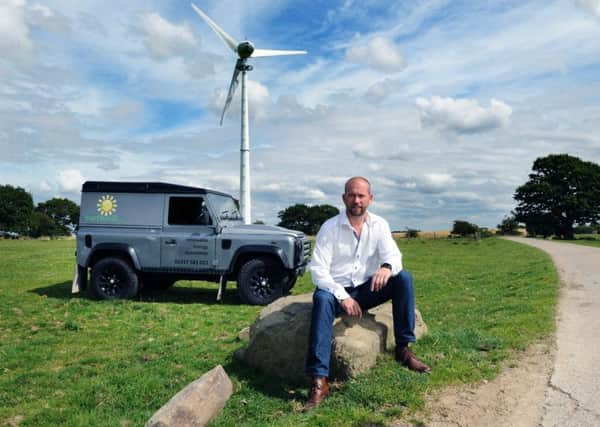Why it's getting harder to cultivate a sustainable future


However, a cut in Government subsidies is making it increasingly difficult for providers of renewable technology and indeed farms to help cultivate a more sustainable future.
One business that over the past five years has helped drive this leaner, greener future is Earthmill. The Wetherby-based company supplied and still services many small-scale wind turbines to farms across the region.
Advertisement
Hide AdAdvertisement
Hide AdSteve Milner founded the business in 2009 after he lost his job during the economic downturn. “I was made redundant from a telecoms company I was working for at the time,” he recalls.
“I’m an electrician by trade originally. I’ve always wanted to start my own business. It meant I could try and take the business experience I’ve had within telecoms work and bolt it together with my electrical experience.”
Earthmill started off by offering a range of renewable technologies. However, as the Government announced the feed-in tariff scheme at the tail-end of the last decade, incentivising people to produce their own electricity, the company switched its focus to energy generation through small-scale wind turbines.
“It gave small to large farms the ability to generate electricity on site, which they would then be able to use themselves and any excess would go back into the grid,” Mr Milner adds. Earthmill has seen at first hand the difference that energy diversification can make on farms. “It allowed businesses to take a little bit more control over one of the biggest costs they’ve got, which is energy.
Advertisement
Hide AdAdvertisement
Hide Ad“It also gave them a 20-year revenue stream from the energy that they generated.
“We supply lots of small farms, medium farms, dairy farms and other high-energy-use farms. In some cases they would reduce their bills by up to 70 per cent.”
A reduction in overheads from renewables can particularly be a boon for dairy farms, says Mr Milner: “If you look at one of the biggest single overheads of a dairy farm it is its electricity bill.
“Electricity bills have been fairly volatile in terms of change. If you look at the price of milk, you pay more for a litre of water in a supermarket than you do for a litre of milk nowadays, and that’s fundamentally wrong if you think about how much work and energy goes into it.
Advertisement
Hide AdAdvertisement
Hide Ad“They’re really up against it from both sides, farmers are. What this technology did was it significantly reduced their overheads. It also then gave them a secondary income into their business for the winter months, when it’s windier, which will cover the cost of the investments and then eventually allow a profit stream.”
Typically, a farm would have to invest £250,000 to £500,000 in the technology. It would then get this investment back over the next decade, while reducing energy costs along the way.
“A turbine would cost £250,000. You’d get around £30,000-a-year income and that’s after operating costs. Your net profit will be £30,000 a year. The scheme has changed now so it would be about £10,000 a year so it wouldn’t actually pay for itself any more,” says Mr Milner.
The past 18 months have proven turbulent for the onshore wind energy generation sector, with the Government announcing changes to feed-in tariffs.
Advertisement
Hide AdAdvertisement
Hide Ad“The last wind turbine we installed was in August last year. When the Government made its announcement 18 months ago we had over 120 turbines in planning. We’ve now got one, which is a long-standing project in Hull,” says Mr Milner.
“It hasn’t slowed it down, it hasn’t tapered it off – it’s just pulled the rug out from under the industry.”
Despite the uncertainty the company has faced in the past 18 months, and the unsure economic conditions to come, Mr Milner says Earthmill will weather the storm. “It’s been very sad to have to lose so many people when the business was young and exciting and it was a special place to be,” he says.
“Earthmill now is a much smaller operation but we’re here to survive.”
Advertisement
Hide AdAdvertisement
Hide AdA lot of wind turbines tend to be found in the uplands, which provide good exposure, and Earthmill has a number in the East Yorkshire Wolds.
“Our sites tend to be just single or occasionally double turbines on a farm. They’re not wind farms as such,” says Mr Milner. “They’re only 30 to 40-meter towers rather than the 100, 120-meter towers that you get on commercial-sized wind turbines.”
That raises one of the issues faced by the small-scale turbine industry. Many people’s image of turbines is coloured by large-scale wind farms, so businesses like Earthmill can face resistance.
“Most of the objections we’ve ever had with wind turbines tended to be quickly overcome when you could show people the actual small scale of the project,” says Mr Milner.
Advertisement
Hide AdAdvertisement
Hide AdNevertheless, he says: “Over 70 per cent of the UK population believe that onshore wind generation is positive. But the reality is it’s the small percentage that don’t want it on their doorstep who have the loudest voice.”
Yet despite the widespread public support for companies like Earthmill to continue thriving, Mr Milner believes there will need to be a change in Government policy. “Once it’s in place it’s of benefit to business and society as a whole. At the moment nobody will be investing in that technology because you’d be making all the investment without any return,” he says.
“Whilst the environment is very important, these guys are running businesses and they have to do what commercially makes sense.
“I would hope certainly over the next two to five years we’ll see a change in policy that will reignite the industry.”